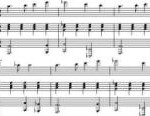Tehran Flute Choir is a 40-member orchestra of Iran’s best flutists; Iran’s best flutists? Yes! If you write down the names of the greatest Iranian flute players who participate at concerts and contribute to academic centers in Iran, you will see that most of them are among the choir’s members.
Tag Archives: Azin Movahed
A Miracle in the Iranian Music: About Tehran Flute Choir’s Eight-year Tenacity
Latest posts
- Transition to Enlightenment: Six Lectures on Mozart’s String Quartets (5)
- Nasser Masoudi: The Voice of Gilan and a Legacy of Iranian Music
- Farhad Poupel: The Voice of the Shahnameh in the Orchestras Around the World
- Five Major Myths About Mozart’s Life
- Bahma Rajabi Passed Away!
- Reza Vohdani; Unveiling unpublished works, preservation of Iranian classical music
- Ahmad Pejman Passed Away!
- Timeless or Timely: The Role of Historical Context in Defining Artistic Value
- Leading the Charge in Censorship
- The Legacy of Khosrow Jafarzadeh
- Transition to Enlightenment: Six Lectures on Mozart’s String Quartets (4)
- Fereydoun Shahbazian, An Iranian Musical Icon Passed Away
From Past Days…

Polyphony in Iranian Music (IV)
Two choirs alternatively perform Veŝ Tavaré Na avaz (Transcription 5). The second group starts the avaz before the first group finishes it; consequently, two different voices coincide (Transcription 5, staves 2 and 5).

Iranian Fallacies – Composition and Arrangement
In the tradition of classical music, it is generally tried to use the same technical terms related to music in all countries. Even in the cultures in which native terms exist to refer to musical terms, usually the better known universal terms are employed.

Interview with the Makers of the New Qeychak (I)
On occasion of the 8th anniversary of launching HarmonyTalk Online Journal on 6 April 2012, Reza Ziaei, master luthier and researcher on classical music instruments (violin family), announced that the first phase of the project to improve Qeychak has borne fruit. The new instrument would feature a bowl of ribs and the material used for the surface would be wooden. Carrying out the second phase of the project took more than 7 years engaging the new members of Reza Ziaei’s Workshop. In this phase, new researches were conducted from different aspects on the Qeychak and the modern versions of the instrument which were introduced previously by other instrument makers. The available versions of the instrument were studied in terms of their weak and strong technical features.

A Note on the Occasion of Houshang Zarif’s Demise
No introduction is needed when talking about the position of the late Houshang Zarif (1938-2020) in the Iranian music. His character and personality are so well-known among musicians that his name per se is a symbol and role model for the Iranian youth. “Becoming Houshang Zarif” is the dream of many young people who enter the world of music in Iran and many of whom retire regretting the realisation of this dream.

Iranian Fallacies: Iranian Chords
Finding a way to harmonize the Iranian music has been the subject of controversy among Iranian musicians for a long time. Some believe in the creation of harmonies for Iranian music based on a method which is similar to the tierce harmony; while others have either selected or invented some other methods. There are also some musicians who do not basically agree with the harmonization of the Iranian music.

A brief examination of Ardavan Kamkar’s Santour playing style
I still think of those fish in a crystal bowl for the Haft sin table and those disappointed old men who went out to sell blackfish.

“The Art of Silence” Project Will be Released
Shaahin Mohajeri, the award-winning Iranian microtonal compose, has contributed to The Art of Silence is an international project which features unpublished pieces by microtonal composers from Iran, Japan, the United States, and other countries.

Rare documents of Tehran Opera Company published in Europe
The year 2020 marks the 10th anniversary of Evlin Baghcheban’s death. She played a crucial role to promote opera and choral music in Persia (Iran). Born to an Assyrian-French family in Turkey, she studied singing and piano at the Ankara State Conservatory. In 1950 Evlin married the Persian composer and fellow student Samin Baghcheban and moved to Tehran.

HarmonyTalk Journal’s Twentieth Anniversary Celebration
On the 10th of Khordad, 1403 (equivalent to May 30, 2024), the twentieth anniversary celebration of the online journal “HarmonyTalk” took place at the Ersbārān Cultural Center. The event garnered such interest from enthusiasts that the venue was completely filled.

Persian Music: “Mahour the Great” in Austria
In 1990 an Austria-based Persian musician Khosro Soltani, in cooperation with Hossein Alizadeh, put out an album entitled, Ancient Call A New (Nobang-e Kohan). After many years, a few ancient Persian instruments such as Sorna, Karna, Naghareh,etc. have been used, instruments which have been left out of the circle of Persian classical musical instruments for centuries.